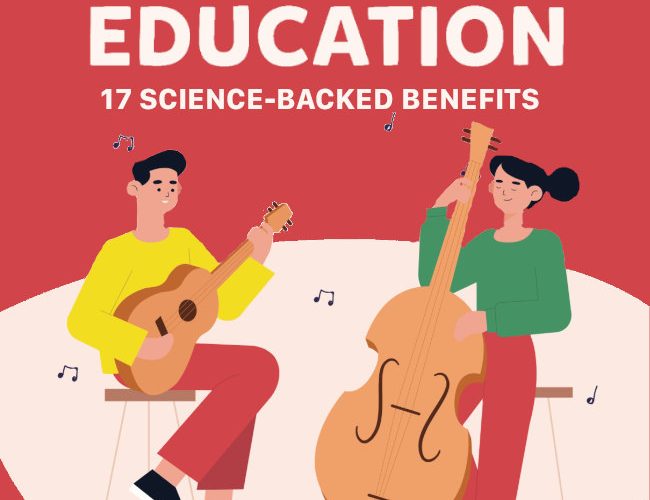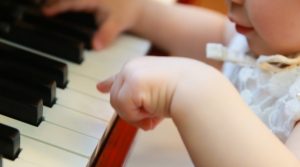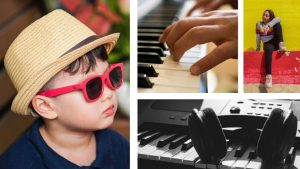Music education can uncover hidden talents and lifelong passions, but did you know that music also boosts non-musical outcomes?
Scientific research is revealing surprising and positive effects reaped by young people who make, play, or listen to music.
From better grades in English, math, and history to improved emotional management and social skills, music education is proving to be an important ingredient in whole-person development.
Let’s dive in and examine the evidence.
Music education benefits [INFOGRAPHIC]

Examining the evidence
These 17 compelling studies reveal how music positively impacts children’s cognitive, social, and emotional development.
1. Enhances vocabulary
Improving and increasing vocabulary by learning new words and their meanings can be a lifelong process, particularly in childhood, where vocabulary is constantly informed by the school, parents, books, television shows, and, of course, musical choices.
The learning process can certainly have its amusing (and embarrassing) moments for parents of verbose kids, but boosting vocabulary, and mastering its usage, is a life skill they’ll use time and again.

One 2009 study of second-grade students demonstrates a link between musical instruction and effective use of vocabulary and verbal sequencing.
Children were split into two groups, an experimental group that received three years of piano instruction, and a control group which received no musical instruction, whether scholastic or private.
At the end of the study, the experimental group scored significantly higher at vocabulary and verbal sequencing ability when tested. (Source)
Key study/paper: Piro, J. M., & Ortiz, C. (2009). “The effect of piano lessons on the vocabulary and verbal sequencing skills of primary grade students” Psychology of Music, 37(3), 325–347.
Source: https://journals.sagepub.com/doi/abs/10.1177/0305735608097248
2. Supports cognitive function
Clear, effective thinking, quick recollection, and good decision-making are all related to healthy cognitive function, something that can be improved and developed through mental “exercise”.
Learning about and participating in musical education is linked to improvements in cognitive function, which is seriously beneficial to children’s developing brains.
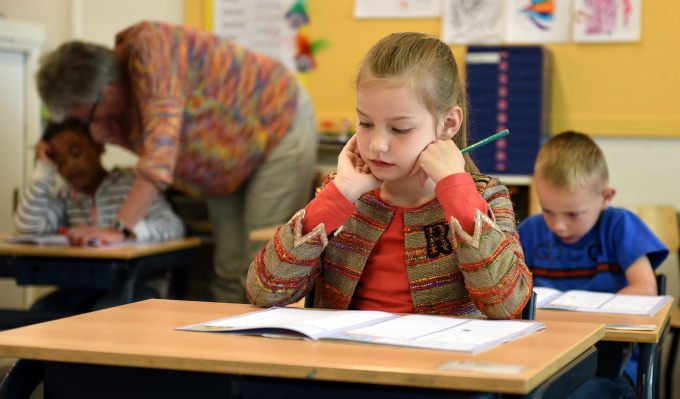
An assessment of the relationship between cognitive development and structured musical education divided a group of over seventy 4 to 6-year-old children into subgroups in which approximately half the sample population participated in musical instruction.
Both before and after this participation, children were assessed via the Stanford-Binet intelligence scale.
After 30 weeks of 75-minute training sessions, music students scored higher on the SB Bead Memory subtest, correlating musical training with a boost in spatial-temporal reasoning ability. (Source)
Key study/paper: Bilhartz, T. D., Bruhn, R. A., & Olson, J. E. (1999). “The Effect of Early Music Training on Child Cognitive Development” Journal of Applied Developmental Psychology, 20(4), 615–636.
Source: https://www.sciencedirect.com/science/article/pii/S0193397399000337
3. Develops reading and writing ability
Reading and writing are foundational aspects of not only your child’s education but their life beyond it.
Good reading comprehension is a necessary requirement of many jobs, as is being able to write with clarity and technical correctness.
Though language and composition courses are traditionally thought of as places to increase these skills, music education also has the potential to improve kids’ ability to read and write.
A meta-analysis on the impact of music education on academic achievement addresses data sourced from the National Center for Educational Statistics, which reports that, within a sample population of over 13,000 high school sophomores, those who participated in music education demonstrated higher grades in English classes. (Source)
Key study/paper:Donald A. Hodges & Debra S. O’Connell (2005). “The Impact of Music Education on Academic Achievement” The University of North Carolina at Greensboro
Source: http://citeseerx.ist.psu.edu/viewdoc/download?doi=10.1.1.564.7004&rep=rep1&type=pdf/
4. Encourages self-esteem
Positive self-esteem is linked with happiness and success, and it begins in childhood. Children who don’t feel good about themselves can have trouble being assertive, making friends, and trying out new things they’re hesitant about.
When kids participate in empowering activities like music education, they often begin to feel better about themselves and their skills, backed by validating reassurance from peers, teachers, and parents.
In a study of 117 Montreal fourth-graders, no participants had received music instruction previously, all had a family income of under $40K a year, and none had a piano in their home.
These students were divided into two groups — an experimental group that would go on to receive weekly individual piano lessons for the next three years, and a control group that received no such instruction.
At the end of the three-year study, those who had participated in the experimental group scored consistently higher in the area of self-esteem than those who had not. (Source)
Key study/paper:Costa-Giomi, E. (2004). “Effects of Three Years of Piano Instruction on Children’s Academic Achievement, School Performance and Self-Esteem“. Psychology of Music, 32(2), 139–152.
Source: https://journals.sagepub.com/doi/abs/10.1177/0305735604041491
5. Increases verbal memory
Quick recollection of the spoken word is useful in various situations. It’s helpful when taking notes or with tests in class, makes social interactions more fluid, and, generally, helps us avoid the frustration of forgetfulness.
For kids whose brains are still developing, opportunities to improve memory should be encouraged. As it turns out, music education can play a vital role in boosting verbal recollection skills.
One study from the University of Hong Kong measured the long-term effects of instrumental training in childhood on verbal memory by dividing 60 female students into two groups.
One group of under 12-year-olds had trained for at least six years on a Western musical instrument, while the other had not.
Each subject was read a list of 16 words, repeated three times. Subjects were then asked to recall as many words as possible.
It was demonstrated that those in the group who had received musical training consistently remembered more words than their non-musical counterparts. (Source)
Key study/paper: Chan, A. S., Ho, Y.-C., & Cheung, M.-C. (1998). “Music training improves verbal memory” Nature, 396(6707), 128–128.
Source: https://www.nature.com/articles/24075?source=post_page/
6. Boosts IQ
IQ, or intelligence quotient, can be a rather controversial topic — as it isn’t, strictly speaking, a measure of exactly how intelligent a person is.
Rather, IQ is a measure of a person’s ability to use reasoning, logic, and provided data to correctly answer a question, make a prediction, or come to a conclusion.
A long-term positive association between private music instruction and a boosted IQ was demonstrated by one 2006 study, which assessed a group of 6 to 11-year-old children receiving music lessons.
In tests that measured these children against their non-musical peers, music lessons were shown to correlate with general and long-lasting improvement with both IQ and cognitive ability.
Interestingly, these tests showed that music lessons delivered the same results (re. IQ and cognitive ability) among all the young participants, despite their diverse, disparate backgrounds such as varied family income, parental education level, and other extracurricular activities. (Source)
Key study/paper:Schellenberg, E. G. (2006). “Long-term positive associations between music lessons and IQ” Journal of Educational Psychology, 98(2), 457–468.
Source: https://psycnet.apa.org/buy/2006-06234-014
7. Develops empathy
The way children relate to their peers and interact socially is often informed by empathy, their ability to perceive, understand, and relate to emotional experiences had by others.
Using empathy consistently to moderate social behavior is a measure of maturity, and some childhood experiences can help foster such empathic feelings.
In a 1990 study assessing children with a mean age of 12 years, participants were divided into two groups. The first group was comprised of children who had received six or more years of piano or violin training prior to the study, while the second group was comprised of non-musical schoolchildren.
Each group was assessed using the Epstein Empathy Scale and Battle Self-Esteem Scale — the group which had received previous musical training scoring higher at both empathy and self-esteem than their non-musical peers. (Source)
Key study/paper: Hietolahti-Ansten, M., & Kalliopuska, M. (1990). “Self-Esteem and Empathy among Children Actively Involved in Music” Perceptual and Motor Skills, 71, 1364–1366.
Source: https://journals.sagepub.com/doi/abs/10.2466/pms.1990.71.3f.1364
8. Raises math and history scores
While academic achievement and ability come naturally to some children, others have to work at it a bit harder.
Subjects like math and history, which rely heavily on recollection and critical thinking, can be especially problematic for some kids. As it turns out, time spent learning to play music can play a significant role in improving their grades in these subjects.
In Hodges and O’Connell’s 2005 meta-analysis of academic achievement related to music education, it was discovered that participation in music not only improved grades in English, but also in math, history, and science.
The meta-analysis also goes on to cite 14 studies in which music education is correlated with higher academic achievement scores. (Source)
Key study/paper:Donald A. Hodges & Debra S. O’Connell (2005). “The Impact of Music Education on Academic Achievement” The University of North Carolina at Greensboro
Source: http://citeseerx.ist.psu.edu/viewdoc/download?doi=10.1.1.564.7004&rep=rep1&type=pdf
9. Reduces aggressive behavior
Aggressive behavior in children is often as troubling to those kids themselves as it is to adults, as they may be struggling with feelings such as fear, sadness, or loss of control.
Addressing those feelings, and channeling them into learning and self-expression, can help to reduce the tension that leads to outbursts, tantrums, or physically aggressive behavior.
In one 2007 study, the effect of music education on childhood aggression was measured by dividing 48 participants into two groups.
One group of children participated in two weekly music education sessions of 50 minutes per session, while a second control group remained untreated.
After 15 weeks of music intervention, the treated group had significantly reduced aggressive behaviors and demonstrated improvement in self-esteem, while the control group demonstrated no change. (Source)
Key study/paper:Choi, A.-N., Lee, M. S., & Lee, J.-S. (2010). “Group Music Intervention Reduces Aggression and Improves Self-Esteem in Children with Highly Aggressive Behavior: A Pilot Controlled Trial” Evidence-Based Complementary and Alternative Medicine, 7(2), 213–217.
Source: https://www.hindawi.com/journals/ecam/2010/465730/
10. Teaches planning ability
Effective planning skills require critical thinking and the use of logic, as they’re simply not inborn. Learning to plan well is a skill that requires education and life experience to develop, while some kids struggle to simply get from point A to point B.
Certain activities requiring cognitive skills, including music education, can help improve planning ability.
A longitudinal analysis of the executive functions of primary school children as they relate to experience in music education divided children into four groups.
Two groups participated in music education, one in visual arts, and one as a control group with no changes.
A range of neuropsychological tests administered after the exercise showed higher scores in inhibition, planning, and verbal intelligence in children in the music education group. (Source)
Key study/paper:Jaschke, A. C., Honing, H., & Scherder, E. J. A. (2018). “Longitudinal Analysis of Music Education on Executive Functions in Primary School Children” Frontiers in Neuroscience, 12.
11. Encourages perseverance
The ability to persevere in the face of challenges and difficult situations is certainly a virtue, and it’s certainly one that’s earned through hard work and experience.
Engaging in artistic and musical training that demonstrates the reward of improvement for their efforts can play a major role in encouraging perseverance in children.
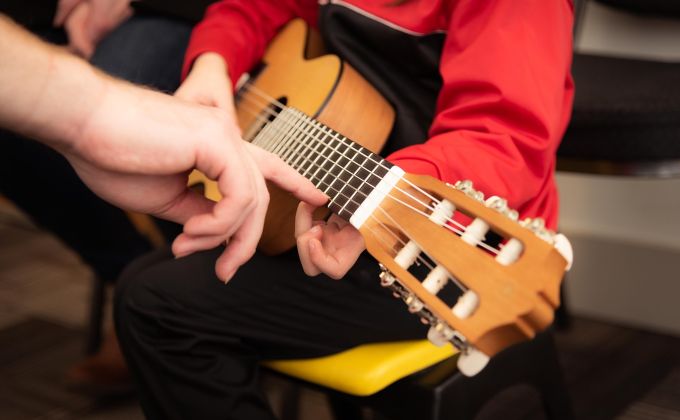
A 1992 study measuring the attention and perseverance behaviors of preschool children taking part in Suzuki violin lessons grouped 80 children between the ages of 3 and 5 into five subgroups. The first took individual violin lessons, and the second took individual and group lessons.
Two of the remaining groups engaged in other classes, while the final control group had no curriculum change.
Analyzed tapes of the lessons demonstrated that the first two groups both scored higher on attention tasks, while the group engaged in both individual and group violin lessons spent a great deal more time on the perseverance task, demonstrating the ability to persevere. (Source)
Key study/paper: Scott, L. (1992). “Attention and Perseverance Behaviors of Preschool Children Enrolled in Suzuki Violin Lessons and Other Activities” Journal of Research in Music Education, 40(3), 225–235.
Source: https://journals.sagepub.com/doi/abs/10.2307/3345684
12. Improves articulation
A well-rounded vocabulary helps children to become articulate speakers, but this is only one aspect of speaking well.
Using correct pitch and cadence is also important, as it helps to clearly convey what’s being said as well as the intended tone behind it, something with which children sometimes struggle.
In a longitudinal study of 32 children, it was demonstrated that a link between musical training and the brain plasticity that allows for pitch discrimination is likely to exist.
The children in the study, who had no previous musical training, were split into two groups; one group received painting training, while the other received musical training.
After six months of training, the children who’d studied music tested higher in reading ability and pitch-discrimination ability in speech. (Source)
Key study/paper: Sylvain Moreno, Carlos Marques, Andreia Santos, Manuela Santos, São Luís Castro, Mireille Besson (2009). “Musical Training Influences Linguistic Abilities in 8-Year-Old Children: More Evidence for Brain Plasticity”. Cerebral Cortex, 19(3):712-713.
Source: https://academic.oup.com/cercor/article/19/3/712/436400
13. Protects against dementia
Dementia and other cognitive impairments are devastating diagnoses to receive, but we now know that certain lifestyle factors can play a role in mitigating their likelihood of occurrence.
In addition to healthy physical activity, a good diet, and general awareness of existing health conditions, keeping the mind sharp through regular mental exercise is also a preventative measure.
As one fascinating study reveals, playing an instrument in childhood may well offer the mind that much-needed workout.
A 2014 study published in the International Journal of Alzheimer’s Disease assessed 157 pairs of twins who had discordant diagnoses of cognitive impairment — meaning that one twin was diagnosed while the other was not.
Of those pairs, 27 were also discordant for playing an instrument in childhood, meaning that one twin was non-musical. Past training in a musical instrument correlated significantly with a lowered risk of dementia or cognitive impairment later in life. (Source)
Key study/paper: Balbag, M. A., Pedersen, N. L., & Gatz, M. (2014). “Playing a Musical Instrument as a Protective Factor against Dementia and Cognitive Impairment: A Population-Based Twin Study” International Journal of Alzheimer’s Disease, 2014, 1–6.
Source: http://www.ncbi.nlm.nih.gov/pubmed/25544932
14. Facilitates anxiety management
Learning to regulate or tolerate extreme emotions can be troublesome for kids; not only are they still learning about the world, but their minds and brains are also developing — a necessary aspect of emotional resilience.
Managing such impulses, or dealing with feelings of anger or anxiety, can be made easier through learning to play a musical instrument, as one study notes.
A 2014 study on the correlation between playing musical instruments and cortical thickness maturation assessed 232 subjects between the ages of 6 and 18.
MRI brain scans were administered a total of three times, occurring at two-year intervals. It was determined that playing an instrument was indeed associated with faster maturation of cortical thickness, a part of the brain which is used in emotional and impulse regulation. (Source)
Key study/paper:Hudziak, J. J., Albaugh, M. D., Ducharme, S., Karama, S., Spottswood, M., Crehan, E., … Botteron, K. N. (2014). “Cortical Thickness Maturation and Duration of Music Training: Health-Promoting Activities Shape Brain Development” Journal of the American Academy of Child & Adolescent Psychiatry, 53(11).
Source: https://www.sciencedirect.com/science/article/abs/pii/S0890856714005784
15. Boosts standardized test scores
Every year, the faithful #2 pencil gets trotted out for another go at standardized tests.
While a week spent with test booklets and tiny bubbles to fill in isn’t much fun for kids, in comparison with their regular education, these tests play an important role in helping to demonstrate whether teachers, schools, and districts are working effectively in measuring each child’s level of general competence.
Though some children find it difficult to study for these tests, instrumental music training can actually play an important role in boosting their results.
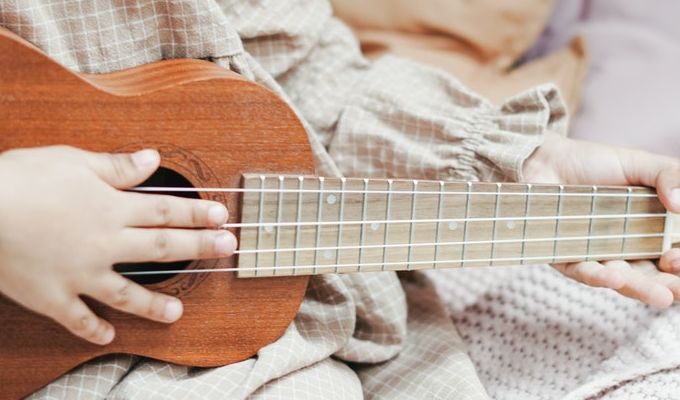
In a study that compared the Ohio Proficiency Test results of instrumental music students to those of their non-musical peers, a correlation between improved standardized test results and instrumental training was demonstrated.
Tests from fourth, sixth, and ninth graders were assessed, and instrumentally trained students scored significantly better than non-instrumental students in every subject, which included citizenship, science, reading, and math. These results held true across all grade levels. (Source)
Key study/paper:Fitzpatrick, K. R. (2006). “The Effect of Instrumental Music Participation and Socioeconomic Status on Ohio Fourth-, Sixth-, and Ninth-Grade Proficiency Test Performance” Journal of Research in Music Education, 54(1), 73–84.
Source: https://journals.sagepub.com/doi/abs/10.1177/002242940605400106
16 Refines perceptual motor skills
Sensory play and motor skill development are tremendously important parts of early childhood education, and not without reason.
The combined use of the senses and motor skills is called perceptual motor skill, which, in turn, informs coordination, proprioception, athletic ability, and various other aspects of our physical lives.
One 1981 study divided a group of children between the ages of 4 and 6 into two groups; an experimental group, which received education in an integrated musical and physical education program, and a control group, which received education solely in movement exploration.
After 24 of these sessions, assessment of the groups revealed that those in the experimental group improved significantly in motor, auditory, and language areas of perceptual motor skill. (Source)
Key study/paper:Brown, Judy, et al. “Effects of an Integrated Physical Education/Music Program in Changing Early Childhood Perceptual-Motor Performance” Perceptual and Motor Skills, vol. 53, no. 1, 1981, pp. 151–154.
Source: https://journals.sagepub.com/doi/abs/10.2466/pms.1981.53.1.151
17. Creates happiness
Joy is an essential element of human existence, leading to feelings of natural fulfilment and acting as a motivator to push us forward.
There are numerous ways we all seek happiness, and everyone, particularly children, have a unique take on what makes us feel joyful.
Throughout history, music has been inextricably linked to expressions of emotion, and it’s certainly an equalizer in terms of creating happiness, as even science agrees.
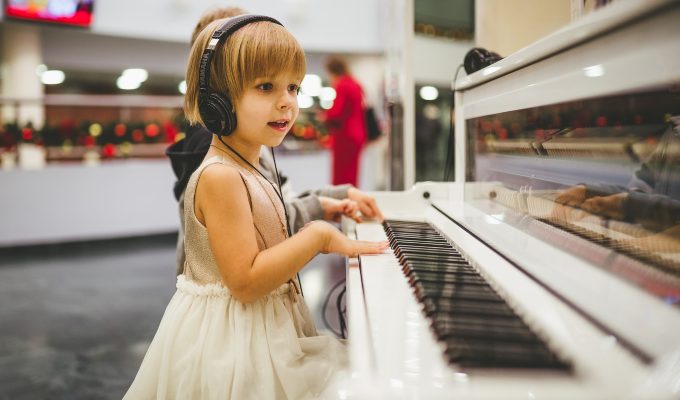
A 2013 Canadian study that tested the association between self-directed music listening and global happiness recognized a link between adolescents listening to their chosen tunes and an increase in their feelings of happiness.
These results were measured against those who listened to music not of their own choosing, noting that an autonomous choice of music was more likely to reflect on one’s personal pleasure and experience, thus leading to feelings of joy. (Source)
Key study/paper:Morinville, A., Miranda, D., & Gaudreau, P. (2013). “Music listening motivation is associated with global happiness in Canadian late adolescents”. Psychology of Aesthetics, Creativity, and the Arts, 7(4), 384–390.
Source: https://psycnet.apa.org/record/2013-35731-001
Wrapping up
Whether it’s about boosting scholastic ability, improving social interactions, or simply providing joy, the essential role that musical education can play in our children’s lives cannot be overstated.
Studying and performing music in the classroom, at private lessons, or at home, has been proven to offer a wealth of benefits to our kids, inspiring a sense of pride and fostering motivation that can benefit them throughout their lifetime.


